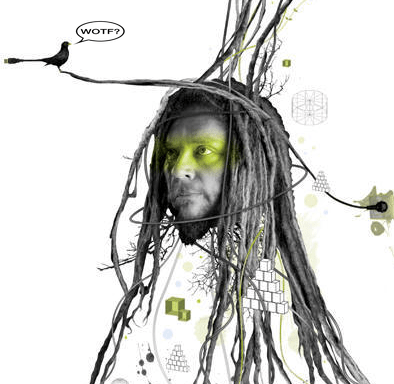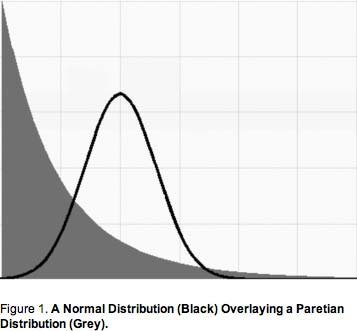Who Owns The Future? ~Jaron Lanier

Tayken Schizo Review
This post is very likely to feel schizophrenic. It's admittedly half book-review and half speculative contemplation, and the direction your personal scale tips isn't likely to be something I have any influence in ultimately determining. As I've started reading Jaron Lanier's, Who Owns The Future (2013), I've been struck early and often by overt connections to cryptocurrencies and the future landscape of DApps, while also being utterly intrigued by the fact that reference to the technological phenomenon of crypto and blockchains are never explicitly mentioned. In fact, in nearly 400 pages, the only reference I could scavenge is one lonely reference to "bitcoin" in an early and inconsequential footnote.
As I continue dissecting this book (which I'm truly captivated by so far), I want to use Steemit as my cognitive sandbox and potential sounding board. I've been transcribing quotes that I think will resonate with this particular audience and I invite you to share your interpretations (in support or opposition) as I share mine.
This is, in many ways, a selfish and experimental use of the platform. I prefer to think critically about the ideas presented in the books that I read, and this offers the potential for an added layer of perspective I wouldn't otherwise receive. Hopefully this endeavor is perceived in the spirit with which I intend and not as a means of profiting off of my otherwise self-serving pursuits of glorified note-taking.
People are treated as small elements in a bigger information machine, when in fact people are the only sources or destinations of information, or indeed of any meaning to the machine at all.
In the age of hyper-data, we've lost track of how humans fit into the equation. Ironic since we are both the original sources and ultimate destinations of any information created.
A new kind of middle class, and a more genuine, growing information economy, could come about if we could break out of the "free information" idea and into a universal micropayment system.
Does this not perfectly exemplify Steemit (and other similar crypto-based platforms)? Why does Lanier sidestep the potential of cryptocurrencies, which was well-established when he would have been writing this book? "...if we could break out..."? What am I missing? Bitcoin represented "breaking out" like nothing that had come before.
Every person is constantly feeding data into the cloud these days. The value of such information could be treated as genuine, but it is not. Instead, the blindness of our standards of accounting to all that value is gradually breaking capitalism.
Once again, I see Steemit. A platform which does treat information as genuine and places value on it accordingly. While it's true that capitalism is breaking, I'm still unsure of what/who will be viewed as the culprit, and I'm not so quick to assume that the value doesn't still have time to be recognized.
As the information economy arises, the older specter of a thousand science fiction tales and Marxist nightmares will be brought back from the dead and empowered to apocalyptic proportions.
If the information economy stays the course with Moore's law at the helm, is apocalyptic nightmare an appropriate description of where we're headed?
Even the most successful players are undermining the core of their own wealth. Capitalism only works if there are enough successful people to to be the customers.
The romanticism is winning and those at the top are blinded by their own success. A thriving middle class isn't just good for those in the middle, it's essential for everyone playing the game. Until that's realized, I'll still be fearful of our ultimate fate.
Digital information is really just people in disguise.
YES! We are the information...the information is us. It's amazing how far removed we've become from the reality of information origination. I'm not sure that "disguise" is the best way to describe it, but the sentiment is accurate. I'm concerned that it's a full-on invisibility cloak at this point.
Even if you think God is no more than a human invention, you must admit that another profoundly ancient idea we humans have invented has ensnared us even more. I am referring, of course, to money.
We don't draw enough parallels between religion and finance. Both rely on deeply engrained sociological constructs that seem to place an unbalanced (and unhealthy in my opinion) weight on speculation and assumption. Both are fully regulated by an elite few who claim to be looking out for the greater interest of the many, when in reality, they are succumbing to even deeper and darker human conditions of hypocrisy and greed.
Newly uninterrupted currents disrupted the shimmering mountain of the middle class levees. The great oceans of capital started to form themselves into a steep, tall, winner-takes-all, razor-thin tower and an emaciated long tail.
You'll need to read the book to truly appreciate this analogy, which Lanier falls back on with frequency, but the truth is undeniable. It doesn't take distributions expert to see how slippery the slope has become. Do we even have an awareness of just how long and emaciated the tail has become?

Credit: All quotes above were written by Jaron Lanier
Much ❤ -- @Tayken
♡ ♡ ♡ ♡ ♡ ♡ ♡ ♡ ♡ ♡
Connect on: Instagram | Twitter | Facebook | Snapchat
Support Me: 1EB9MEfCC3fYo6dmW7zuWFJDVC53GVNA8J (BTC)
♡ ♡ ♡ ♡ ♡ ♡ ♡ ♡ ♡ ♡
As the information economy arises, the older specter of a thousand science fiction tales and Marxist nightmares will be brought back from the dead and empowered to apocalyptic proportions.
The world is an interesting place- statistics say that things are getting better, however, everyone seems to become less hopeful, more cynical. People think that things are getting worse! I'm not sure if this is part of the human condition, or if it is part of the times. I agree with you that cryptocurrency seems to be the answer for many of his stated concerns. I don't know about the value of capitalism, however. It's breaking- but if anything, it is breaking itself. I'm still working through my own ideas about this, but I don't know if true capitalism (laissez faire- style) is actually sustainable. If everyone is working for their own best interests, the powerful are always going to eventually bury the less powerful, despite the fact that this IS NOT in their best interests. Great post, sounds like a really interesting book!
Always appreciate your thoughts. Given what I’ve learned of you, I really think you’d find value in the read. Lanier straddles a strange line with such deep ties to Silicon Valley. When we stop changing, we die.
Are you planning on attending the meetup in Colorado Springs this weekend?
Congratulations @tayken! You have completed some achievement on Steemit and have been rewarded with new badge(s) :
Click on any badge to view your own Board of Honor on SteemitBoard.
For more information about SteemitBoard, click here
If you no longer want to receive notifications, reply to this comment with the word
STOP